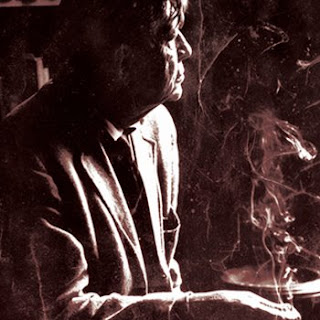
He told us we were free to choose
But, children as we were, we thought -
'Paternal Love will only use
Force, in the last resort,
On those too bumptious to repent.'
'Friday's Child' - W.H. Auden.
Auden's poem, of this title, was written in 1958 in memory of Dietrich Bonhoeffer, who was martyred at Flossenburg, Germany, on April 9, 1945. It's a strange attribution, given that the poem is both a wistful recollection of the death of Christ (Good Friday's Child) and a damning indictment of the ineptitude of God.
Auden seems genuinely bemused by the theological tension between divine sovereignty and human agency. He accuses God of having given away too much.
Perhaps He frowns, perhaps He grieves,
But it seems idle to discuss
If anger or compassion leaves
The bigger bang to us.
What reverence is rightly paid
To a Divinity so odd
He lets the Adam whom He made
Perform the acts of God?
His point seems to be that, since God allows us to make our own mistakes, and does not intervene, He is not worthy of our praise. In fact, God is irrelevant. For Auden, it appears not to matter at all whether or not God is real. We have no real way of knowing:
And must put up with having learned
All proofs or disproofs that we tender
Of His existence are returned
Unopened to the sender.
Even the resurrection of Christ fails to answer the question. Auden "dare not say" whether the seal of the tomb remained unbroken. Christ on the cross, like God in heaven, remains silent. Our questions remain unanswered. A God who will not intervene when His Son is suffering "a death reserved for slaves" deserves nothing from us. This is Auden's caustic judgment:
The self-observed observing Mind
We meet when we observe at all
Is not alarming or unkind
But utterly banal.

* * * * * * * * * * * *
How can it be that one man, sitting at ease, can spout such invective, whilst another, awaiting his death, places His confidence in the God revealed in Jesus Christ? To one, the ways of the Divine are childish and stupid; to the other they are wonderfully profound. Bonhoeffer was painfully aware of the tension between human evil and divine restraint. Most of his adult life had been lived in the shadow of unspeakable horror. Unlike Auden, however, who bolted from Europe to the sanctuary of the United States, Bonhoeffer returned to his native Germany. Auden chose to doubt, and blamed God for doing nothing. Bonhoeffer chose to believe, and did something.


No comments:
Post a Comment